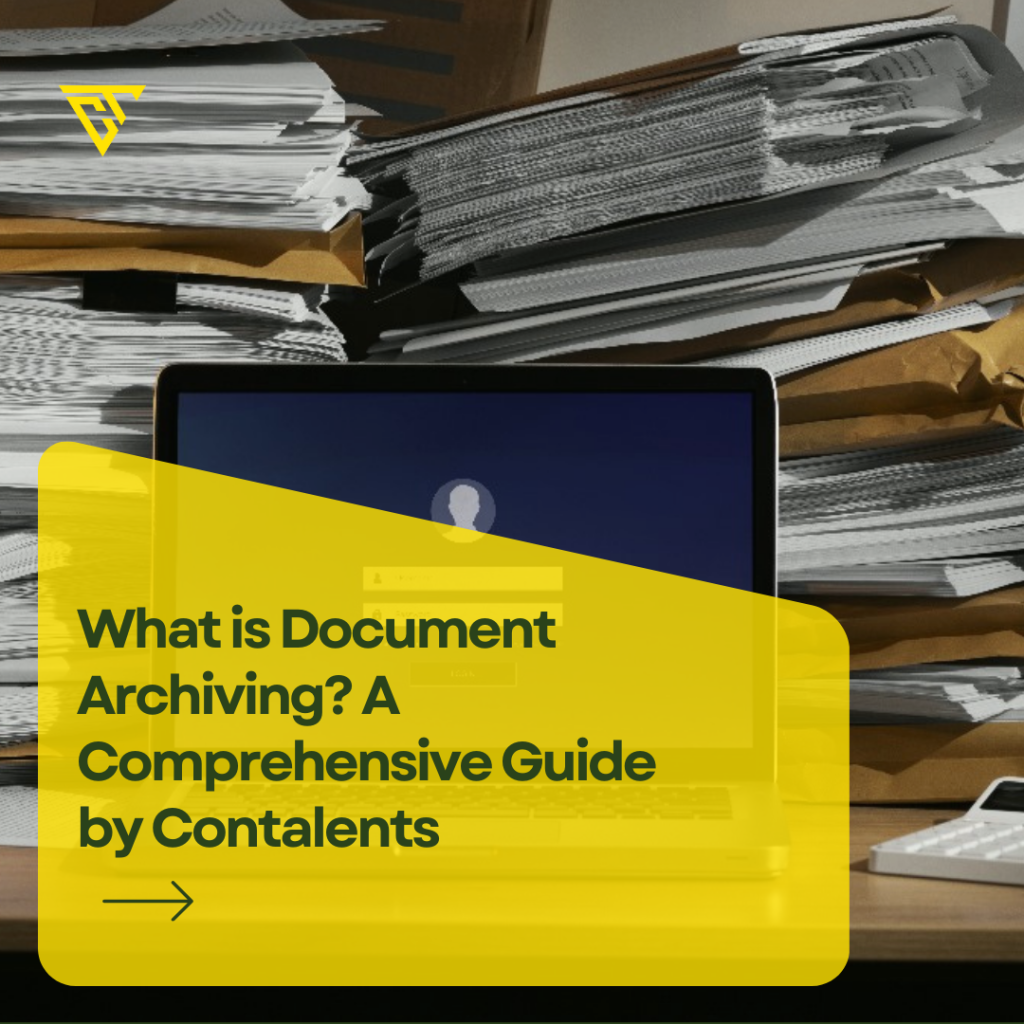
Running a business means drowning in paperwork. We’ve witnessed countless companies struggle with mountains of contracts, invoices, employee records, and compliance documents that pile up faster than anyone can organize them. After 35 years helping businesses across Egypt manage their backend operations, we’ve learned that document archiving isn’t just about storage—it’s about survival.
Understanding Document Archiving in Business Context
Document archiving is the systematic process of storing, organizing, and managing business documents for long-term retention and easy retrieval. Unlike simple file storage, proper document archiving creates a structured system that preserves important records while keeping them accessible when needed.
Think about the last time your accounting team spent three hours hunting for a single invoice from two years ago. Or when your HR department couldn’t locate an employee’s original contract during a dispute. These scenarios cost real money and create genuine headaches that document archiving prevents.
Our team has worked with over 140 clients, and we guarantee that businesses without proper document archiving systems lose an average of 12 hours per week just searching for misplaced files. That’s nearly two full workdays wasted every month.
Why Document Archiving Matters More Than Ever
Paper documents deteriorate, get misplaced, or destroyed in accidents. Digital files scatter across different computers, cloud accounts, and email threads. Without a central archiving system, your business records become a liability instead of an asset.
We recently helped a manufacturing client who faced a regulatory audit. They needed to produce safety inspection records from the past five years within 48 hours. Companies with organized document archiving systems handle these requests in minutes. This client spent three days scrambling through file cabinets and old computers, nearly missing the deadline.
Legal compliance drives much of the need for document archiving. Egyptian businesses must retain financial records for seven years, employee files for specific periods, and various industry documents according to regulatory requirements. Missing documents during audits can result in penalties ranging from 10,000 to 100,000 Egyptian pounds, depending on the violation.
Types of Documents That Need Archiving
Every business generates documents that require different retention periods and access levels. Financial records like invoices, receipts, and tax documents need immediate accessibility during the current year but can move to archive status afterward.
Employee records present unique challenges. Contracts, performance reviews, and disciplinary actions must remain accessible throughout employment and for several years afterward. We’ve seen HR teams waste entire days reconstructing employment histories because original documents weren’t properly archived.
Customer data, contracts, and correspondence create another category requiring careful handling. These documents often need quick access for customer service purposes while maintaining security and privacy protections.
Building an Effective Document Archiving System
Creating a document archiving system starts with understanding your document types and usage patterns. We recommend categorizing documents by department, retention requirements, and access frequency. This approach prevents the common mistake of treating all documents the same way.
Physical document archiving requires climate-controlled storage, proper labeling systems, and regular maintenance. Many businesses underestimate the space and organization needed. A typical small business generates approximately 500-800 pages of documents monthly that require archiving.
Digital document archiving offers better search capabilities and space efficiency but needs robust backup systems and security measures. We’ve helped clients recover from situations where poorly managed digital archives led to data loss during system crashes.
The Business Impact of Poor Document Management
Companies without proper document archiving face predictable problems. Staff productivity drops as employees spend increasing amounts of time searching for information. Customer service suffers when representatives can’t quickly access account histories or previous interactions.
Risk increases dramatically during audits, legal proceedings, or compliance reviews. We’ve witnessed businesses pay significant penalties simply because they couldn’t produce required documentation within specified timeframes.
Storage costs escalate when documents accumulate without systematic archiving. One client discovered they were paying rent on three storage units filled with unsorted paperwork dating back fifteen years, including documents that should have been disposed of years earlier.
Making Document Archiving Work for Your Business
Successful document archiving requires consistent processes and regular maintenance. Start by identifying which documents your business must retain and for how long. Create clear procedures for document classification, storage, and retrieval that your team can follow without confusion.
Consider outsourcing document archiving to experienced providers who understand regulatory requirements and best practices. This approach often costs less than managing archiving internally while delivering better results and reducing compliance risks.
Document archiving transforms chaotic paperwork into organized business assets. Companies that invest in proper archiving systems save time, reduce stress, and protect themselves from costly compliance issues. The question isn’t whether you can afford to implement document archiving—it’s whether you can afford not to.